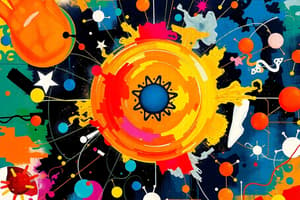Podcast
Questions and Answers
What is the purpose of a hypothesis in scientific research?
What is the purpose of a hypothesis in scientific research?
- To provide a detailed background on the subject.
- To describe consistent phenomena in nature.
- To predict an outcome that can be tested. (correct)
- To analyze data collected from experiments.
Which statement best describes a scientific theory?
Which statement best describes a scientific theory?
- A theory is a well-substantiated explanation based on evidence. (correct)
- A theory is a law that describes a relationship in nature.
- A theory is a testable prediction of an outcome.
- A theory is a guess that cannot be tested.
What does the scientific method begin with?
What does the scientific method begin with?
- Hypothesis Formation
- Observation (correct)
- Conclusion
- Research
Which branch of science focuses on the study of living organisms?
Which branch of science focuses on the study of living organisms?
What principle is emphasized in scientific ethics?
What principle is emphasized in scientific ethics?
Study Notes
Definition of Science
- Systematic study of the natural world through observation and experimentation.
- Aims to build knowledge and understanding of phenomena.
Key Concepts
-
Hypothesis:
- Testable statement predicting an outcome.
- Basis for experimentation.
-
Theory:
- Well-substantiated explanation based on a body of evidence.
- Can evolve with new discoveries.
-
Law:
- Describes a consistent phenomenon or relationship in nature (e.g., Newton's Laws of Motion).
-
Data:
- Quantitative or qualitative information collected during research.
- Analyzed to support or refute hypotheses.
Scientific Method
- Observation: Identify a problem or phenomenon.
- Research: Gather existing information and resources.
- Hypothesis Formation: Develop a testable prediction.
- Experimentation: Test the hypothesis through controlled methods.
- Analysis: Interpret results using statistical methods.
- Conclusion: Draw conclusions based on data.
- Communication: Share findings through publications or presentations.
Branches of Science
- Physical Science: Study of non-living systems (e.g., physics, chemistry).
- Life Science: Study of living organisms (e.g., biology, ecology).
- Earth Science: Study of Earth's systems and processes (e.g., geology, meteorology).
- Social Science: Study of human behavior and societies (e.g., psychology, sociology).
Importance of Science
- Drives technological advancements.
- Informs public policy and health decisions.
- Enhances understanding of complex systems and global challenges.
Scientific Ethics
- Honesty and integrity in research.
- Respect for intellectual property.
- Responsible reporting and presentation of findings.
Current Trends in Science
- Interdisciplinary research (e.g., bioinformatics, environmental science).
- Emphasis on sustainability and climate change solutions.
- Advancements in technology influencing data collection and analysis (e.g., AI, big data).
Definition of Science
- Science is the systematic study of the natural world through observation and experimentation
- The goal of science is to build a comprehensive understanding of natural phenomena
Key Concepts
- A hypothesis is a testable prediction about the outcome of an experiment
- A theory is a well-substantiated explanation of a phenomenon, supported by a large body of evidence
- A law is a description of a consistent pattern or relationship in nature
- Data is the information collected during research, which can be quantitative or qualitative
Scientific Method
- The scientific method is a systematic process for investigating the natural world
- Observation involves identifying a problem or phenomenon to investigate
- Research involves gathering information and resources to inform the study
- Hypothesis formation involves developing a testable prediction to guide the experiment
- Experimentation involves testing the hypothesis using controlled methods
- Analysis involves interpreting the results using statistical methods
- Conclusion involves drawing inferences from the data and interpreting its significance
- Communication involves sharing findings through publications, presentations, or other means
Branches of Science
- Physical science focuses on the study of non-living systems
- Life science focuses on the study of living organisms
- Earth science focuses on the study of Earth's systems and processes
- Social science focuses on the study of human behavior and societies
Importance of Science
- Science helps drive technological advancements, such as new medical treatments and communication devices
- Science informs public policy decisions, such as environmental regulations and healthcare initiatives
- Science enhances our understanding of complex systems and global challenges
Scientific Ethics
- Research is guided by ethical principles like honesty and integrity
- Intellectual property must be respected, such as patents and copyrights
- Findings must be reported and presented responsibly and accurately
Current Trends in Science
- Interdisciplinary research is becoming increasingly common, with scientists from different fields collaborating on projects
- There is a growing emphasis on sustainability and climate change solutions
- Technological advancements are influencing data collection and analysis, with tools like artificial intelligence and big data playing an increasingly important role
Studying That Suits You
Use AI to generate personalized quizzes and flashcards to suit your learning preferences.
Description
This quiz covers fundamental concepts in science including the definitions of hypothesis, theory, and law. Explore the scientific method's steps, from observation to conclusion, and understand how data plays a crucial role in experimentation. Test your knowledge on how these elements combine to enhance our understanding of the natural world.




